Our son is not even two years old yet, and he's been tested for food allergies twice already. Here are the reasons his pediatrician recommended allergy testing and why we agreed to do it, as well as a few other helpful tips for getting your your baby tested for food allergies.
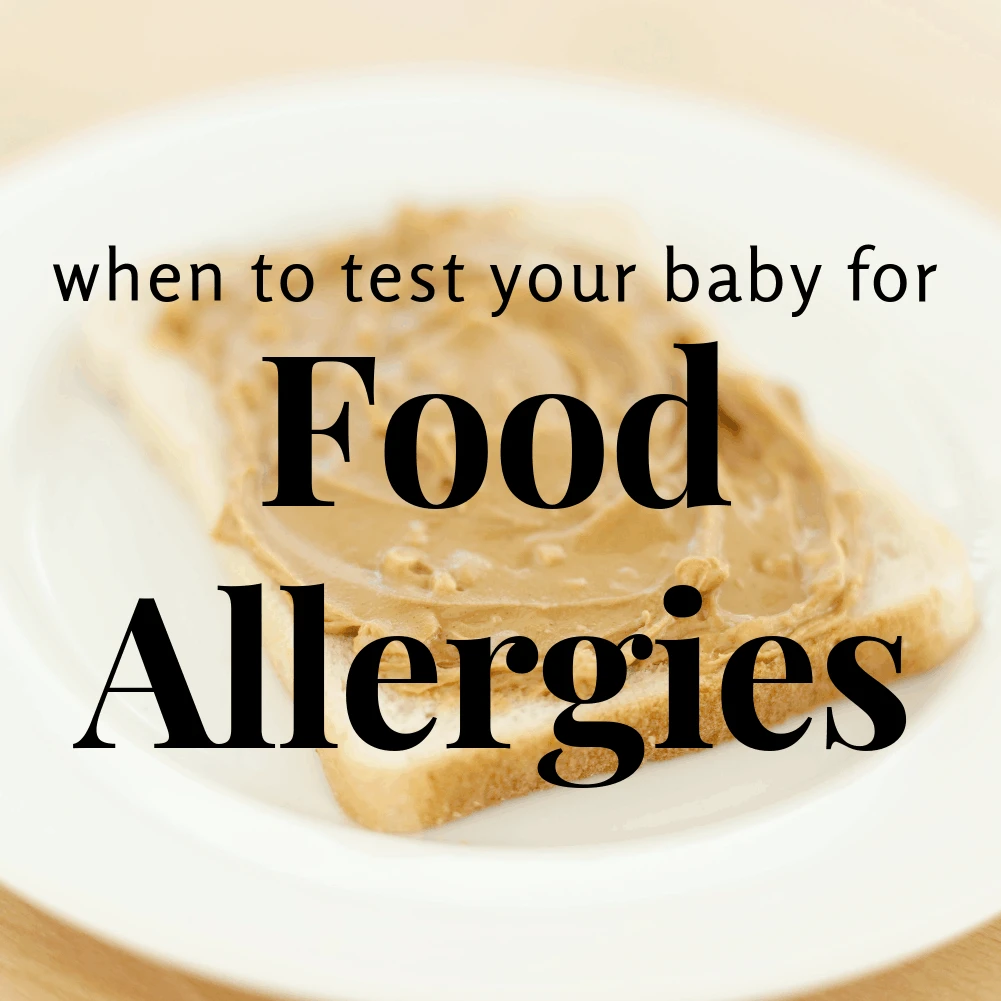
Please note, just like with any article on this blog or anywhere on the internet: discuss everything with your child's pediatrician instead of following advice you read online. The content of this article is meant to give you ideas of what to discuss with your pediatrician, and what I would tell a friend if they asked me if their baby should be tested for allergies.
This post contains affiliate links. As an Amazon associate, I earn from qualifying purchases.
Why we tested our son for food allergies:
When our son turned one, his pediatrician recommended to have him tested for food allergies. Our son hated eating, had trouble gaining weight, and had a lot of reflux issues since he was a tiny baby, so his pediatrician wanted to see if food allergies were behind some of these problems.
The allergy test results showed that our son is allergic to cow's milk, eggs, and beef, and he supposedly has a slight sensitivity to peanuts. The milk allergy was not a surprise to us, since our son threw up every time he had cow's milk or milk-based formula. We had been avoiding milk for that reason anyway.
Unfortunately the allergy results did not shine any light onto his eating problems, since he was not eating any eggs, beef, or peanut butter because of his picky eating. Luckily soy and almonds were just fine, which means that we were free to try soy milk, soy formula, and almond butter instead of milk and peanut butter.
The second time our son was tested for food allergies was because we asked his pediatrician to do it: our son had four allergic reactions within the span of one month and we could not figure out what he was reacting to. Each time he had the same allergic reaction: red blotchy spots all over his face and itchy red eyes.
Because of these allergic reactions I was very nervous about introducing new foods or even trying some 'old' foods he's tried before that are common allergens (such as shrimp, strawberries, etc.). So we decided to get him tested for allergies for peace of mind. Again, it was confirmed that he's allergic to milk, eggs, and beef. Peanuts did not come up this time (yay!), and neither did any common airborne allergens.
So we still don't know what he had a reaction to, but at least we can continue feeding him the same foods we've been feeding him before.
Throughout the past two years we've had lots of conversations with his pediatricians (yes, that's plural... he's seen FIVE of them in his two years of life because we keep wanting to get second and third opinions about some of his eating and weight-gain issues).
You would think all babies should be tested for food allergies before being introduced to foods that might potentially be dangerous for them, but this is not the case. Our pediatricians said that allergy testing is not necessary for most babies. Here is what the pediatricians advised regarding testing babies and toddlers for allergies:
When to test your baby for food allergies:
Test your child for food allergies if they have any reaction to any foods.
Seeing your child have an allergic reaction is one of the scariest things. The panic that sets in as you see your kid's face turning red is hard to describe. Immediately I start running to get the Benadryl, get dressed (do I have time to put on a bra?), make a mental plan about whether to rush to the hospital or call 911, think about whether it's worth the time to strap him into his car seat or if I should just let him loose in the back seat and just drive, carefully watch his face for any signs of tongue swelling, anaphylaxis, or difficulty breathing, check his body for any more redness, administer the Benadryl... all in the span of 2 minutes. It's terrifying.
And to add insult to injury, my son kicks and screams when I give him medicine (remember, this is a picky eater who typically HATES having people put anything in his mouth), and he always throws up as soon as he tastes the Benadryl because it tastes pretty gross, so who knows if the medication even got into his system? I sometimes end up giving two doses just in case.
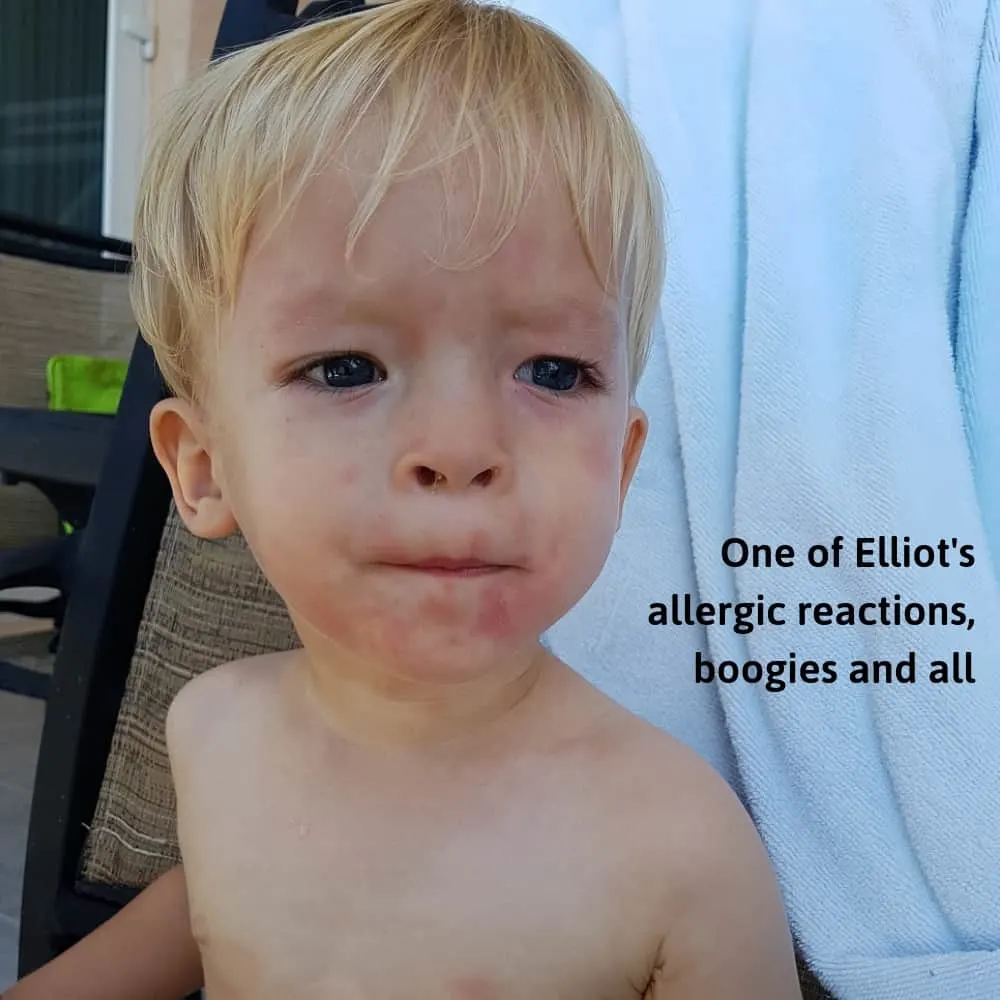
Luckily each time the allergic reaction has been pretty mild, his tongue and breathing was fine, and the redness starts going away within a few minutes of giving him Benadryl.
But it is still an awful experience for everyone, so I would encourage calling your pediatrician and seeing if they would recommend allergy testing if your child has an allergic reaction to any food.
Getting your baby or toddler tested for allergies after they have an allergic reaction will make it less scary to introduce new foods to them, since you'll know whether your child is allergic to any common foods, and will have a better idea whether they have a low or high risk or food allergies in general.
And yes, I now have Benadryl at home at all times, as well as in our son's daycare lunch bag.
Test your child for food allergies if they throw up for what seems like no apparent reason.
Throwing up was the only sign of milk allergy that our son showed. He would throw up hours later so we never put it together.
We didn't even think it was an allergy at first because there were no other "typical" allergy symptoms and he often threw up while eating anyway because of his sensitive gag reflex. If anything, we thought it was maybe lactose intolerance, or that he just didn't like the taste of milk or formula. Turns out that our son is not lactose intolerant, but actually has a cow's milk allergy - these are two different things.
So if your child throws up pretty frequently, especially after eating or drinking the same foods, it might be worth talking to your pediatrician about testing them for food allergies.
Test your baby if they start scratching their ear while eating
Scratching their ear or touching their throat while eating can be a sign of an allergic reaction. Babies and toddlers might try to scratch their ear if their throat is itchy, or worse - closing up.
Test your baby for allergies if they have any reflux or eating issues.
Reflux and eating issues were the reason that our pediatrician recommended allergy testing for our son the first time around. They were trying to see if any of the foods he eats might be causing him discomfort in the form of reflux, silent reflux, GERD, or heartburn, which would make him not enjoy eating.
I actually know of some toddlers with allergies who decided for themselves they did not like eating a few foods they were allergic to before the parents even saw any symptoms or thought to test their child for allergies. Our bodies are amazing and sometimes they know what's right and what's wrong for them, and refusing to eat might be your baby's or toddler's way of telling you something is not right about what you are feeding them.
Test your baby for allergies if there is a family history of food allergies.
Our pediatrician said that babies from families with a history of food allergies are at a higher risk of having food allergies. In cases where either of the parents has food allergies (especially if it's a severe allergy), most pediatricians recommend testing for food allergies before trying to introduce your baby to those foods. Again, talk to your doctor and see if this applies to you.
A few tips to consider when planning on testing your baby for allergies:
Blood test or skin prick test?
Talk to your doctor about whether a blood test or a skin test is the best choice for your baby. Some of our doctors said that both tests have roughly the same accuracy rate. One doctor said that the skin test is slightly more accurate, but to me it sounds like both have about the same rate of success. We ended up having a blood test done the first time, and a skin test the second time. Both tests showed the same results. Keep reading below for tips on deciding which test is best for your baby!
Skin prick test - needle or scratch?
If your doctor recommends the skin prick test, make sure you ask exactly what that means. You see, when I had allergy testing done years ago, the doctor did a skin prick test with a gentle scratch. It did not hurt at all. So when our pediatrician said to do the skin prick test for our almost-two-year-old son, I was all for it. I did NOT want to have to hold my son down to get his blood drawn again. Little did I know that this pediatrician used a needle for every skin prick. So instead of a gentle scratch, each allergen was injected into my toddler's back with a tiny needle similar to when you get your blood drawn from your ring finger.
It freakin' SUCKED. He screamed his head off. He knew when each needle was coming. I had to hold him down for each one. Dozens of needle pricks. And afterwards every time the doctor had to get close to my son to measure the size of each positive reaction (aka each red bump), my son freaked out again. He is not even two and didn't understand that the painful part was over. Poor little guy was so exhausted from the screaming and crying. It was very traumatic.
I would have much rather held my son down for a quick blood draw had I known.
Combine the allergy blood test with other blood work.
If your pediatrician or allergist recommends the blood test for allergies, maybe getting it done when your child needs to get blood work done for any other reason. This way your child does not have to have blood drawn twice, they will just take an extra vial or two of blood. This is what was done for our son the first time around since his pediatrician recommended getting blood work done to try to rule out any other health issues when he was failing to gain weight. And while a blood test SUCKS when you have to hold down your screaming crying baby, it might be a better option if you're getting blood drawn anyway. Talk to your doctor.
Pick a good time for the appointment.
There's never a great time of day for putting your child through stressful and potentially painful tests, but here are a few tips that worked for our son:
- I made sure to make the appointment a couple of hours after a meal so that my son would not be too full because he often throws up if he cries really hard. And throwing up is not what we need during an already stressful time.
- I scheduled the appointment right before his nap so that when he was exhausted from being stressed he just had a bottle of milk for comfort and fell asleep for his afternoon nap.
- Let your kid watch their favorite show on your phone or an iPad while this is all happening. Maybe it'll help distract them in between skin pricks, or help them calm down after a blood draw.
A few last points about food allergies in babies:
- Always keep children's Benadryl (or whatever antihistamine your doctor recommends) on hand, just in case. Put some in the kid's daycare bag, have some at their grandparents' house, have some anywhere you think they might need it. It's just a few dollars but it's worth the peace of mind. And it does work almost instantly to relieve mild allergic reactions. Keep in mind that Benadryl will not stop a severe allergic reaction or anaphylactic shock, so definitely talk to your pediatrician about a plan of action if your child has any allergic reaction, and don't just listen to this blog. Make sure you ask your pediatrician about the appropriate dose for your child.
- If your child does have positive allergy results, talk to your doctor about whether an Epi-pen (or other adrenaline medicine) is needed. Just FYI, our doctor said:
The legal answer is that yes, it's best to have an Epi-pen on hand at all times, since ANYONE can have an allergic reaction to ANYTHING at ANY POINT. However, given the cost of the Epi-pen, the quick expiration date (you need to buy a new one every year!), and the low severity of our son's allergy results and reactions, it's up to me to decide whether we want it.
For now, we decided to skip the Epi-pen.
- A lot of kids outgrow many food allergies by age 4-5. We'll probably get our son tested again around that age and hope for the best because it would be a heck of a lot easier if he could eat milk and eggs!
- You can find more information about allergy testing in children and infants here.
While food allergies are terrifying, they shouldn't stop you from trying to feed your baby. Just do it safely, with your pediatrician advising you if you have questions about any ingredients you should avoid. Here are a few blog posts that might help you feed your picky eater: A few recipe ideas for hiding vegetables in your kids favorite breakfast treats. Lunch and Dinner recipes with hidden vegetables for your picky toddlers. Maybe one of these will work for your kid? If part of your child's struggle with eating is texture/sensory, you might want to try some of these super simple tricks during your next meal to see if they will help your son try new foods. They work for my son!Other posts that might help you feed your picky toddler:
11 Healthy Toddler-Friendly Breakfast Recipes with Hidden Vegetables
Hidden Vegetable Recipes for Toddlers
3 Sensory Tricks That Get my Picky Eater Toddler to Eat

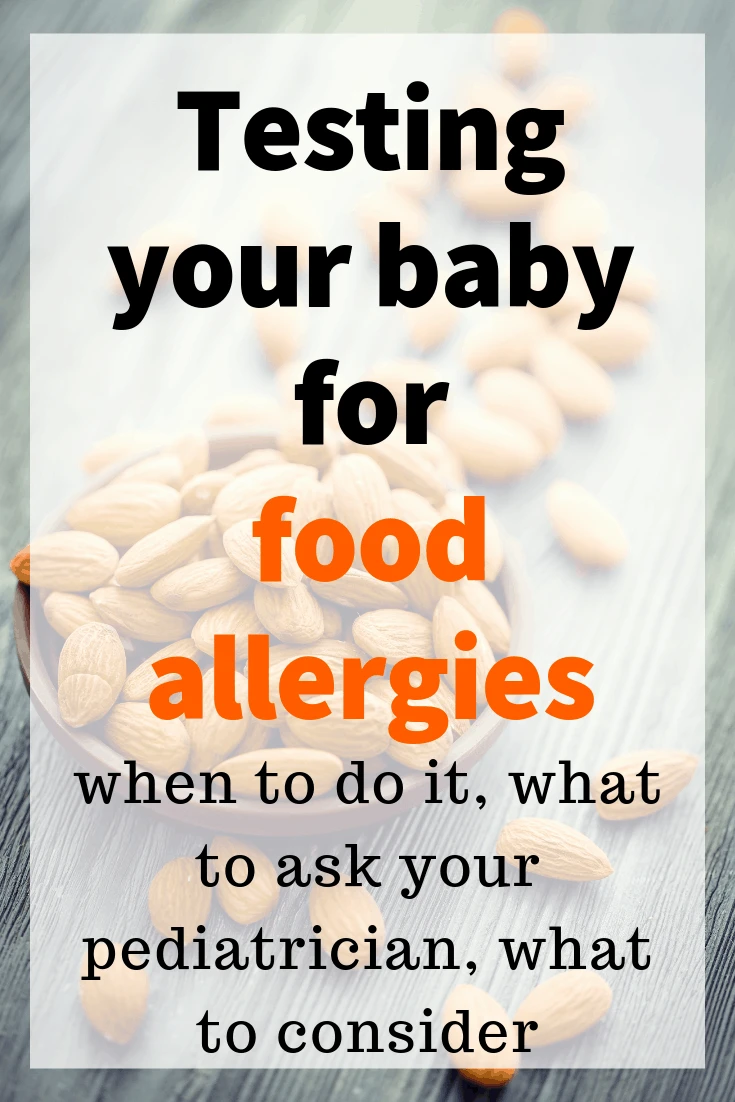

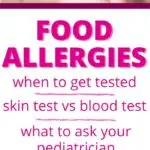



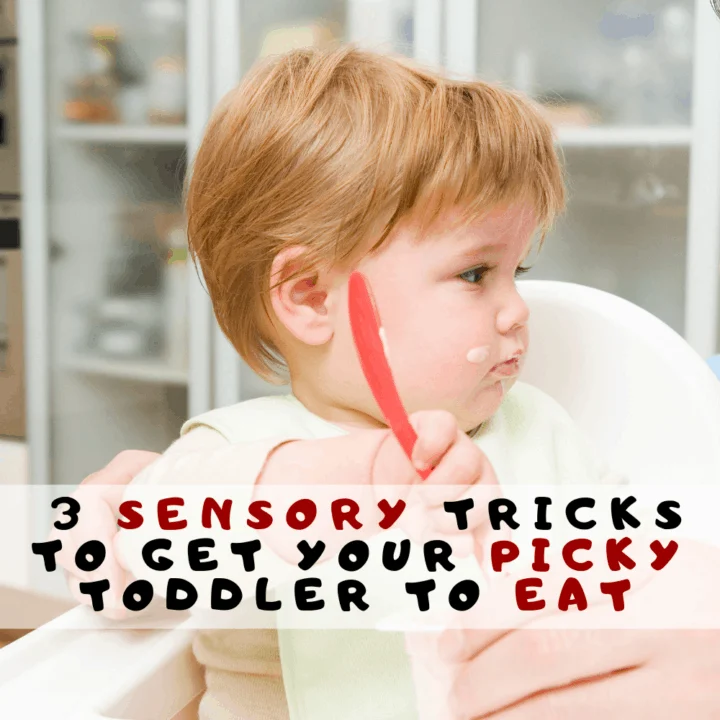
Levi Armstrong
Thursday 6th of August 2020
Kate, thanks for sharing your experience with allergen testing with your sweet boy Elliot. My husband and I recently became parents to a premature baby girl, so we're a bit apprehensive of introducing her to some new food. It's great that you said that we should take her to a pediatrician to get tested for allergies so we wouldn't have to worry too much about introducing food to her since we'll know what common food she'd be allergic to. I'll talk to my husband about this so we can schedule an appointment with a reputable pediatrician. Thanks!
Kate Hansen
Wednesday 15th of January 2020
It's good to know that you need to test them if they throw up for no reason. My daughter has been having an issue with throwing up for a while now. I'll have to look into finding a doctor that can do allergy testing for my daughter.
Kate
Friday 17th of January 2020
Ugh that sounds so stressful. It's been a long time since our son threw up for unknown reasons. Yea definitely check with your pediatrician or call an allergy doctor (though of course an allergy doctor will tell you to come in). In the meantime, you can also try to make a list of foods she's eaten during the day every time she throws up to see if there is a pattern, or see if she was doing any crazy acrobatics before throwing up (our son had to sit still after eating because of reflux and throwing up, but that was a different issue).